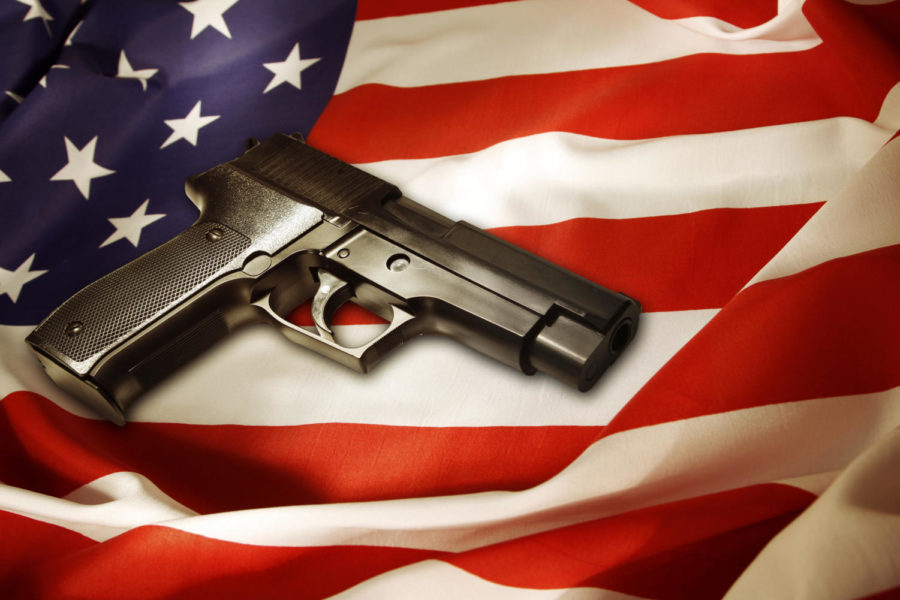Glawe: Our obsession with guns
Columnist Glawe argues that our culture and our obsession with guns and violence has made us numb to horrific acts.
April 1, 2015
Cormac McCarthy’s masterpiece “Blood Meridian” is at once beautiful and horrifying. The epic concerns the Glanton gang, a historical group of scalp hunters hired by Mexican and Texan authorities to massacre the local Native American population. It is a haunting and astounding work of art littered with extreme violence and highlighted by one of the greatest literary characters ever created: the infinite Judge Holden.
A quarter of the way through “Blood Meridian,” I realized just how numb I had become to the violence. The protagonist is shot in the gut almost immediately, a man’s eye is dislodged by another’s thumb and children are senselessly killed and scalped. The numbness was shocking, but perhaps the complete lack of revulsion to all the shooting and killing is a result of my Americanized sentiments where violence now seems a way of life and an acceptance of culture.
I happened to be also reading a book detailing policy prescriptions to reduce gun violence in America. When it comes to violence, Americans are not particularly more violent than other high-income nations. The rates for car theft, burglary, robbery, sexual assault and aggravated assault are similar to those of other high-income countries. What is disturbing is the fact that, when Americans do commit violent acts, the resulting injuries are more likely to be fatal.
The companion book to my reading of “Blood Meridian” was “Reducing Gun Violence in America” by Daniel Webster and Jon Vernick. There is a dubious forward by former New York Mayor Michael Bloomberg, whose opinion I’m reluctant to consider. As it details, the U.S. rate of firearm homicide for children ages 5 to 14 is 13 times higher than the firearms homicide rate of other developed nations. In addition, the overall rate of homicide is even higher — three times higher.
I am reminded here of the children slain at Sandy Hook Elementary School. I remember the day it happened. I remember vividly my parents bringing my kindergartener brother home and holding him tight. Violence is truly everywhere, and “Blood Meridian” seems more relevant now than it ever did. The book escapes itself.
The National Rifle Association’s response to the shooting and our subsequent failed attempts to expand gun control merely confirmed what the whole world already knows, and that is guns are worshipped in this country. The NRA executive vice president Wayne LaPierre bemoaned the reduction of armed presence at our elementary schools. Why is the lack of firearms the problem when it was access to firearms that allowed Adam Lanza to senselessly kill those children?
We are obsessed with guns in this country. Guns can be used for good, and nobody denies it. The harm done by firearms, however, outweighs the potential good. I don’t advocate for the government to take everybody’s guns away, but we must look much deeper into the issue rather than simply prescribing more guns, as if we all have the potential to be a vigilante.
As students, we faced this exact same prescription from Katie Pavlich, who suggested women shoot and possibly kill their assailant on the spot. Once again, the immediate Americanized solution is to combat violence with violence. Let’s imagine where this could lead us. Say a girl was engaging in a sexual activity with somebody she genuinely trusts and perhaps has a deep affection for. Imagine she is sexually assaulted, and she is confronted with shooting her assailant — would she be able to pull the trigger? Would you? Say she does pull the trigger. Does this not compound the immense trauma she must already endure?
The real irony of this column is that if somebody were to sexually assault somebody I love, say, my own girlfriend, I would in all likelihood want to kill that person. I am so embedded with the notion that violence must be the response and my confidence for the “system” to apply an adequate punishment is nonexistent. We live in a culture where a violent response is acceptable and we are numb to any alternative.
Guns cannot be the solution. I will protect anyone’s Second Amendment right, sure, but this ideal that America is filled with vigilantes is silly. I am willing to bet that we are much more inundated with monsters akin to the Glanton gang.
Judge Holden, the most violent and cruel character of “Blood Meridian,” represents violence and war itself. He preaches endlessly that war is the ultimate god — the final solution to everything. Sadly, many Americans find this to be a legitimate position.
When the Glanton Gang first discover the Judge alone and naked in the desert, he is holding a rifle ascribed with the phrase, “Et in Arcadia ego” or “Even in Arcadia, there am I.” Arcadia, in the time of the Greeks, was considered a utopian world or lifestyle. “I” in the painting of this name, means “death.” Even in utopia, death lingers. Even in the most innocent places, such as an elementary school, or a movie theater, or a college campus, the shadow of death resides, and guns, more often than not, permit its presence.







